 W
W"Ashes to Ashes" is a song written and recorded by English singer-songwriter David Bowie. It was the lead single from the 1980 album Scary Monsters and became Bowie's second UK No. 1 single. It is also known for its innovative video, directed by Bowie and David Mallet, which at the time was the most expensive music video ever made.
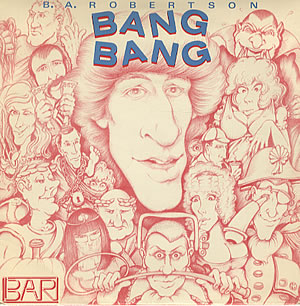 W
W"Bang Bang" is a song performed by BA Robertson. Co-written by Robertson with Terry Britten and produced by Britten, it was released as the second single from his third album Initial Success in 1979.
 W
W"Boys Do Fall in Love" is a song by British singer-songwriter Robin Gibb. It was released as the lead single from his 1984 third solo album Secret Agent.
 W
W"Brilliant Mind" is a song by British band Furniture, from their second album The Wrong People. Released as a single in 1986, it reached No. 21 on the UK Singles Chart in July of that year, and remains as the band's only hit song to chart.
 W
W"Broken English" is a song recorded by English singer Marianne Faithfull for her seventh studio album Broken English (1979). It was released as the second single from the album on 25 January 1980 by Island Records. Written by Faithfull, Barry Reynolds, Joe Mavety, Steve York and Terry Stannard, the song's lyrical theme revolves around terrorism. The inspiration behind the song was Ulrike Meinhof, a co-founder of the terrorist group Baader-Meinhof Gang. Faithfull allegedly got the idea for the song after watching a documentary about the group and was intrigued by its subtitle "broken English... spoken English".
 W
W"Brutality, Religion and a Dance Beat" is a 7" split single of two songs. It contains the songs "Big in Japan", by eponymous band Big in Japan, and "Do the Chud", by The Chuddy Nuddies, both groups formed in the 1970s punk scene of Liverpool. It was released by the Eric's label in November 1977.
 W
W"Camouflage" is a single released by the English musician and comedian Chris Sievey in 1983. The single is notable for its B-side, which rather than containing another song, contains the audio tones for three programmes Sievey created for the Sinclair ZX81 computer. Two programmes were for a video game Sievey created called Flying Train, and the other was the code for the music video to "Camouflage". The video claimed that this was "the world's first computer promo".
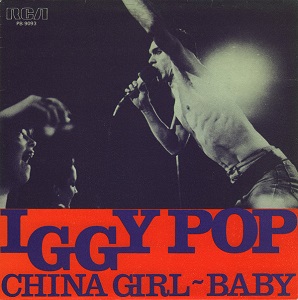 W
W"China Girl" is a song written by Iggy Pop and David Bowie during their years in Berlin, first appearing on Pop's debut solo album The Idiot (1977). The song became more widely known when it was re-recorded by Bowie, who released it as the second single from his most commercially successful album, Let's Dance (1983). The UK single release of Bowie's version reached No. 2 for one week on 14 June 1983, while the US release reached No. 10.
 W
W"Come Dancing" is a 1982 song written by Ray Davies and performed by British rock group the Kinks on their 1983 album State of Confusion. The song was inspired by Davies' memories of his older sister, Rene, who died of a heart attack while dancing at a dance hall. The lyrics, sung from the perspective of an "East End barrow boy," are about the boy's sister going on dates at a local Palais dance hall.
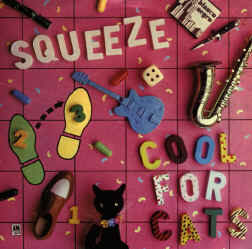 W
W"Cool for Cats" was the second single released from the English rock band Squeeze's Cool for Cats album. The song features a rare lead vocal performance from cockney-accented Squeeze lyricist Chris Difford, one of only three occasions he sang lead on a Squeeze single A-side The song, slightly edited from the album track, peaked at No. 2 on the UK Singles Chart in 1979, making "Cool for Cats" one of the band's biggest hits.
 W
W"Cry Boy Cry" is a song by British new wave band Blue Zoo, released as a single in 1982 from their 1983 album Two By Two. The song is the band's biggest hit, and their only Top 40 entry, reaching No. 13 on the UK Singles Chart in October 1982.
 W
W"Driver's Seat" is a 1978 song by the British band Sniff 'n' the Tears that appears on their debut album, Fickle Heart. The band is considered a one-hit wonder as "Driver's Seat" was their only hit.
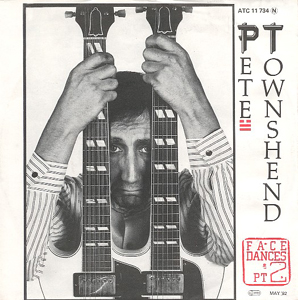 W
W"Face Dances, Pt. 2" is single written and composed by Pete Townshend, most famously known as the guitarist for the Who. The song appears on Townshend's 1982 solo album All the Best Cowboys Have Chinese Eyes.
 W
W"The Face of Dorian Gray" is the debut single written and recorded by English singer Robert Marlow, released as both a 7-inch and 12-inch single in 1983 by Reset Records. Produced by Vince Clarke and Eric Radcliffe, it was recorded at Blackwing Studios in London. The single peaked at No. 83 on the UK Singles Chart, Marlow's only single to chart.
 W
W"The First Picture of You" is a song by English band The Lotus Eaters. It was released as the group's debut single in July 1983, and was included on their debut album No Sense of Sin released the following year.
 W
W"Games Without Frontiers" is a song written and recorded by English rock musician Peter Gabriel. It was released on his 1980 self-titled solo album, where it included backing vocals by Kate Bush. The song's lyrics are interpreted as a commentary on war and international diplomacy being like children's games. The video includes film clips of Olympic events and scenes from the 1951 educational film Duck and Cover, which used a cartoon turtle to instruct US schoolchildren on what to do in case of nuclear attack. This forlorn imagery tends to reinforce the song's anti-war theme.
 W
W"Girls & Boys" is a 1994 song by British rock band Blur. It was released as the lead single from the group's third album, Parklife. Charting at number 5 on the UK Singles Chart, "Girls & Boys" was Blur's first top 5 hit and their most successful single until "Country House" reached number 1 the following year. The single surpassed their previous commercial peak "There's No Other Way" by three spots on the UK Singles Chart, and saw the group achieve greater worldwide success. In the US, the track reached number 59 on the Billboard Hot 100 singles chart, becoming the band's second single to hit the chart after "There's No Other Way". It also reached number 4 on the Modern Rock songs chart.
 W
W"The Honeythief" is a 1986 song performed by the Scottish band Hipsway. It was included on their 1986 self-titled debut album and released as a single, which reached number 17 on the UK Singles Chart, and number 19 on the Billboard Hot 100. Its remix reached number 9 on the US Dance Club Play Singles chart.
 W
W"I Have the Touch" is a song by English rock musician Peter Gabriel from his album Peter Gabriel (1982). The song's working title during the recording sessions was "Hands". This song was featured in the movie The Chocolate War (1988) . The 1996 remix was used in the film Phenomenon of the same year.
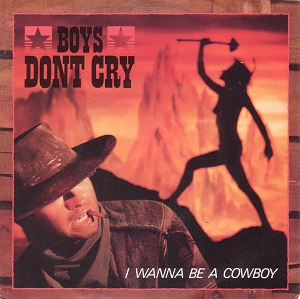 W
W"I Wanna Be a Cowboy" is a single by British pop/rock group Boys Don't Cry. The song was written by four of the band members—Brian Chatton, Nick Richards, Nico Ramsden and Jeff Seopardi—and was released in 1986 as the first new single from their self-titled debut album.
 W
W"Japanese Boy" is a hit single by Scottish singer Aneka, released in 1981. The song became her highest charting release, reaching number one in several countries including the UK. The song's success would eventually lead audiences to associate Aneka closely with both the lyrics' subject matter as well as the kimono that she wore during some televised performances of the song, associations that she found difficult to discard as her career proceeded.
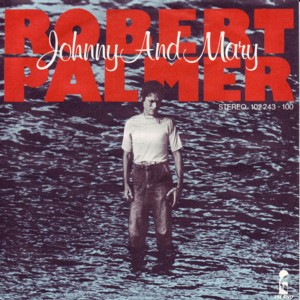 W
W"Johnny and Mary" is a song written and originally performed by Robert Palmer. Palmer's version was recorded in 1980 at Compass Point Studios, New Providence, in the Bahamas. The song was featured on Palmer's album Clues (1980).
 W
W"Juliet" is a 1983 single by British singer-songwriter Robin Gibb, from his second solo album How Old Are You?. The song was a huge hit in various countries in Europe, hitting the No. 1 spot in Germany, Italy and Switzerland and peaking at No. 2 in Austria. In addition, the single was certified gold by the German Bundesverband Musikindustrie in 1983. A music video was also made for this song.
 W
W"Knocked It Off" is a song by Scottish musician BA Robertson, released in October 1979 as the third single from his debut album Initial Success. It became his second Top-Ten hit in the UK, peaking at number 8 on the Singles Chart. The song features a sarangi by Neil Sorrell. The title "Knocked It Off" means, in this context, to become a success somewhat unexpectedly. The lyrics criticise celebrity life, making references to pop and football fame.
 W
W"Ladykillers" is a song by English alternative rock band Lush. It was released by 4AD in 1996 as the second single from the band's third studio album, Lovelife. Known for its feminist themes, the song became one of the band's bigger hits, peaking at No. 22 on the UK Singles Chart, No. 18 on the US Billboard Modern Rock Tracks chart, and No. 15 on the Canadian RPM Alternative 30 chart.
 W
W"Leave It" is a song by English rock band Yes. It appears on their 1983 album, 90125.
 W
W"Let My Love Open the Door" is a song written and performed by Pete Townshend from his 1980 album Empty Glass. It reached the top ten in the United States in that same year, reaching number nine. It reached number five in Canada.
 W
W"Let's Dance" is a song recorded by English singer-songwriter David Bowie, released as the title track of his 1983 album Let's Dance. Written by Bowie and produced by Nile Rodgers of the band Chic, it was released as the lead single from the album in March 1983 and went on to become one of his biggest-selling tracks. It was recorded in late 1982 at the Power Station in Manhattan and was the first song recorded for the album. The end of the song features a guitar solo by then-rising blues guitarist Stevie Ray Vaughan.
 W
W"Life in a Northern Town" is a song by British group the Dream Academy. The song was released as a single from the band's debut studio album The Dream Academy, released in 1985. The song was written as an elegy to British folk musician Nick Drake. Written by band members Nick Laird-Clowes and Gilbert Gabriel, the song was produced by Laird-Clowes with help from Pink Floyd guitarist David Gilmour. The single reached No. 7 on the US Billboard Hot 100 chart in February 1986. It is the band’s highest-peaking chart single in the United States, the UK, and Ireland.
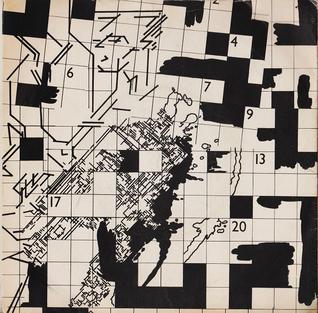 W
W"Living by Numbers" is a song by the English synthpop group New Musik. It was the band's biggest hit worldwide, peaking at No. 13 in January 1980 in the UK and No. 12 in Ireland. The song appeared on the band's debut album, From A to B.
 W
W"Looking for Clues" is a song by English vocalist Robert Palmer, released in 1980 as the second single from his sixth studio album Clues. It was written and produced by Palmer. "Looking for Clues" reached No. 33 in the UK, and No. 105 on the US Billboard Bubbling Under the Hot 100.
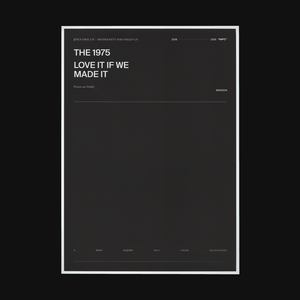 W
W"Love It If We Made It" is a song by English rock band The 1975 from their third studio album, A Brief Inquiry into Online Relationships (2018). It was released on 19 July 2018 through Dirty Hit and Polydor Records as the album's second single. It was written by all the members of The 1975 and was produced by lead vocalist Matty Healy and drummer George Daniel. "Love It If We Made It" is a track that blends electropop, pop, funk, industrial and new wave music and features a strong drum beat and pulsing synths. The song's lyrics criticise the contemporary social climate and allude to numerous political and cultural events such as the US national anthem protests and the death of American rapper Lil Peep.
 W
W"Mirror Mirror" is a song by British pop duo Dollar, released in 1981 as the second single from their third album, The Dollar Album. The song was co-written by Trevor Horn and Bruce Woolley, and produced by Horn.
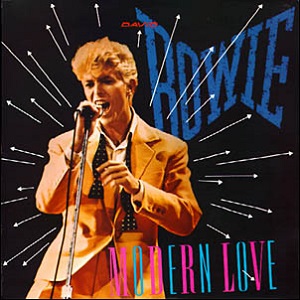 W
W"Modern Love" is a song written by English singer-songwriter David Bowie. It was released as the opening track on his 1983 album Let's Dance and issued as the third single from the album later in the year. Co-produced by Bowie and Nile Rodgers of the American band Chic, the song is a rock song that contains elements of new wave music. It was recorded at the Power Station in Manhattan and was one of the first tracks recorded for the album. It was performed by Bowie on the Serious Moonlight Tour, where it often closed the shows. A music video for the song, directed by Jim Yukich and featuring a performance of the song during the tour, was released in 1983 and played frequently on MTV.
 W
W"Nowhere Girl" is a single by English new wave band B-Movie. It was originally released on 2 November 1980, and later re-released in 1982, reaching #67 in the UK. It later appeared re-recorded on the band's first studio album, Forever Running in 1985. It became a chart-topping single across Europe and received much airplay at the time.
 W
W"Pop Muzik" is a 1979 song by M, a project by English musician Robin Scott, from the debut album New York • London • Paris • Munich. The single, first released in the UK in early 1979, was bolstered by a music video that was well received by critics. The clip featured Scott as a DJ singing into a microphone from behind an exaggerated turntable setup, at times flanked by two female models who sang and danced in a robotic manner. The video also featured Brigit Novik, Scott's partner at the time, who provided the backup vocals for the track.
 W
W"Ricky's Hand" is a song by Fad Gadget, released as a single in 1980. It was the second Fad Gadget single, following "Back to Nature" the previous year. The track was not included on any studio album, predating a debut LP by several months, but does appear on several compilations. Mute Records founder Daniel Miller collaborated on the writing, playing and production.
 W
W"Rock the Casbah" is a song by the English punk rock band The Clash, released in 1982. The song was released as the second single from their fifth album, Combat Rock. It reached number eight on the Billboard Hot 100 chart in the US and, along with the track "Mustapha Dance", it also reached number eight on the dance chart.
 W
W"Running Up That Hill" is a song by the English singer-songwriter Kate Bush. It was the first single from her 1985 album Hounds of Love, released in the United Kingdom on 5 August 1985. It was her first 12-inch single. It was the most successful of Bush's 1980s releases, entering the UK chart at number 9 and eventually peaking at number 3, her second-highest single peak. The single also had an impact in the United States, providing Bush with her first chart hit there since 1978, where it reached the top 30 and featured prominently in the Dance Charts. Bush also performed the song live for the first time with David Gilmour of Pink Floyd at the Secret Policeman's Third Ball in 1987. The song's title for Hounds of Love and all subsequent releases was "Running Up That Hill ".
 W
W"Shock the Monkey" is a song by English rock musician Peter Gabriel. It was released in September 1982 as the second single from his fourth self-titled album, issued in the US under the title Security.
 W
W"Somersault" is a song by the British band Zero 7 featuring Sia. It was released in May 2004 as the second single taken from the band's second studio album When It Falls. It is the third time Zero 7 had featured Sia on a single release, following their singles, "Destiny" and "Distractions".
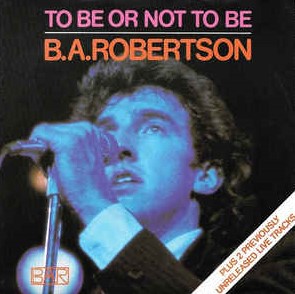 W
W"To Be or Not to Be" is a song by Scottish musician BA Robertson, released in May 1980 as the fifth and final single from his debut album Initial Success. It became his third Top-Ten hit in the UK, peaking at number 9 on the Singles Chart.
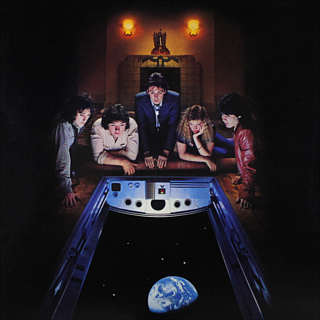 W
WBack to the Egg is the seventh and final studio album by the British–American rock band Wings, released in June 1979 on Columbia Records in America, and on Parlophone in the UK. Co-produced by Chris Thomas, the album reflects band leader Paul McCartney's embracing of contemporary musical trends such as new wave and punk, and marked the arrival of new Wings members Laurence Juber and Steve Holley. Back to the Egg adopts a loose conceptual theme around the idea of a working band, and its creation coincided with a period of considerable activity for the group, which included making a return to touring and work on several television and film projects.
 W
W"Tonight I'm Yours " is a song by Rod Stewart, the title track of his 1981 album Tonight I'm Yours. It was one of three singles released from the album. The song was the lead single internationally except for in the United States, where it was the follow-up to "Young Turks."
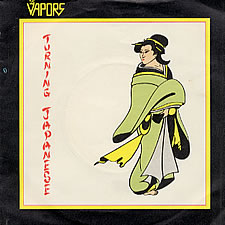 W
W"Turning Japanese" is a song by English band the Vapors, from their 1980 album New Clear Days. It was an international hit, becoming the song for which the Vapors are best known.
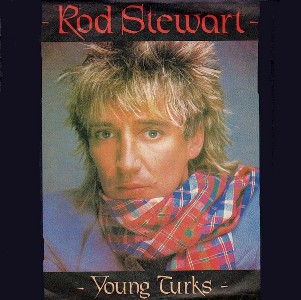 W
W"Young Turks" is a song by Rod Stewart that first appeared in 1981 on his album Tonight I'm Yours. The track presented Stewart backed by a new synthpop and new wave sound, in part influenced by acts like Devo. The term young Turk, which originates from the early 20th-century secular nationalist reform party of the same name, is slang for a rebellious youth who acts contrary to what is deemed normal by society. The phrase "Young Turks" is never heard in the actual song, the chorus instead centering on the phrase "young hearts be free tonight", leading to the song frequently being misidentified as "Young Hearts" or "Young Hearts Be Free".